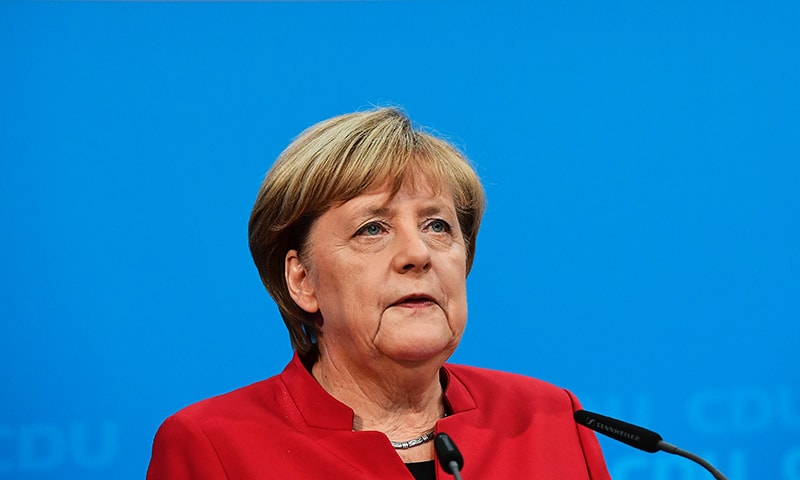German Chancellor Angela Merkel told her party Sunday she will seek re-election next year, a move likely to be welcomed in many capitals as a sign of stability following poll triumphs for Brexit and Donald Trump.
After months of feverish speculation, Merkel announced at a meeting with other leaders of her conservative Christian Democrats (CDU) that she would run for a fourth term, a decision they met with thunderous applause, party sources told AFP.
Merkel, 62, has governed Europe's top economic power, which does not have term limits, since 2005. She is due to hold a news conference at 1800 GMT Sunday.
Another full four-year mandate, which pollsters say she is likely to win, would tie the post-war record set by her mentor Helmut Kohl, who presided over the 1989 fall of the Berlin Wall.
Merkel told the meeting she had struggled to make up her mind, the sources said, but concluded that Germany needed a strong CDU, which has no clear successor to the woman who has led the party since 2000.
She added that next year's campaign would “not be a cakewalk”.
Merkel represents “stability and reliability in turbulent times because she holds society together and stands up to over-simplification” by populists, CDU deputy leader Julia Kloeckner told Welt am Sonntag newspaper earlier Sunday.
“She stands for moderation and centrism instead of cheap headlines.”
'Risk-averse voters'
Merkel is the first woman, the youngest person and the only candidate who grew up in communist East Germany to lead the reunited country.
A pastor's daughter and trained physicist, Merkel is popular among Germans who see her as a straight-shooter and a safe pair of hands in a crisis.
But her decision to let in more than one million asylum seekers over the last two years dented her support.
It also revived the fortunes of the rightwing populist Alternative for Germany party (AfD), which has harnessed widespread anxiety about migration.
Nevertheless, observers said the recent seismic shifts in global politics were likely to drive traditionally risk-averse German voters back into her arms.
“Society's need for predictability and stability could become so overpowering in the 2017 election year that even the creeping erosion of Merkel's chancellorship won't compromise her success at the polls in the end,” left-leaning news weekly Die Zeit said.
More than half of the electorate -- 55 percent -- want Merkel to stay in office, up from 42 percent in August, a poll for Bild am Sonntag newspaper showed Sunday.
As US President Barack Obama exits the stage, many observers say Merkel's importance as a defender of Western values will only continue to grow, with some calling her the new “leader of the free world”.
While the globe braces for potentially radical changes in US leadership under Trump, Britain is wrestling with the fallout from its June vote backing withdrawal from the EU, and France is facing a presidential poll in May that could see far-right candidate Marine Le Pen snatch victory.
Underlining her relative strength, Merkel gathered Obama and the leaders of Britain, France, Spain and Italy at her chancellery Friday for talks on the fight against terrorism, climate change and the strategic threat posed by Russia.
Obama endorsement
On his farewell visit to Berlin, Obama praised Merkel Thursday as an “outstanding partner” and urged Germans to “appreciate” her.
“It's up to her whether she wants to stand again... but if I were here and I were German and I had a vote, I might support her,” he said with a smile.
Misgivings about Merkel's refugee policy were blamed for a string of state election defeats for the CDU over the last year, and sparked an open revolt by its Bavarian sister party, the CSU, which demanded a strict upper limit on incoming asylum seekers.
A survey Sunday showed that Merkel's conservatives would draw 33 percent of the vote if the election were held this weekend, down nine points from the last national poll in 2013.
The centre-left Social Democrats (SPD), junior partners in Merkel's “grand” coalition, were a distant second with 24 percent.
The AfD and the opposition Greens were neck-and-neck with 13 percent and 12 percent respectively, according to independent opinion research institute Emnid.
It is still unclear who will carry the SPD's banner into the race, with party leader Sigmar Gabriel potentially facing a challenge from European Parliament President Martin Schulz.












































